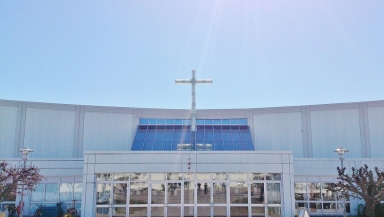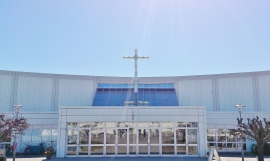
The church in Sweden that is preparing to use drones to drop thousands of Bibles into areas of Iraq controlled by Islamic State today acknowledged that there was a security threat to the church involved.
Earlier this month, the Livets Ord (Word of Life) church in Uppsala, Sweden said it will use drones flying at high altitude to release thousands of small, electronic Bibles into Iraq.
Today, a spokesman for the evangelical free church acknowledged a "security threat" but said this was a price worth paying for the sake of spreading the Gospel.
"We acknowledge that there is a security threat but being a Christian means you realise your faith may not be accepted," the spokesman told Christian Today. "That's the price you have to pay for the Gospel. We have thought it through and discussed it and we don't believe there is a substantial risk but it's difficult to know."
The spokesman confirmed that the project will go ahead in the autumn but would not be more specific about timings. He also said that the cost of each Bible is around $15 (around £12) and that this was already covered by funds raised but would not expand on exactly how many Bibles will be dropped. The church has previously said it would drop "thousands" of the pill-box sized Bibles.
The comments came after a senior pastor at the church, Joakim Lundqvist expanded on the thinking behind the plan in an online posting and denied that the move was an aggressive act or a "wild" idea.
"Ever since the invention of printing, Christians have been involved in sharing the good news of God's love, grace and salvation, by producing, translating and distributing Bibles," Lundqvist said. "The first priority has always been to share the message with people and areas that have not yet heard the message, or with those living under oppression, persecution and in areas where basic human rights are denied them."
Lundqvist denied reports that characterised the plan as an "attack" on Islamic State. "Some media has described the project as a 'Bible attack on ISIS'. This is completely untrue and an expression of the media's constant search of anything sensational and spectacular," he said. "This is not a political statement, nor an 'spiritual counter attack on terrorism'. What we want is to make the message of Gods love available to people who need it and long for it the most."
The church is declining to name its "partners" in the project. "Without naming names, we want to emphasize that our partners are very knowledgeable and well versed in the region's terms and conditions," Lundqvist said. "This is not a wild idea from a church far away from the reality of the Middle East, but a well thought out, efficient and carefully prepared project that we have had clearly described to us, and have chosen to support."
The pastor said that Christians in the region lacked Bibles. "In the Middle East, and especially in Iraq, a spiritual awakening of historical dimensions is taking place. In these past few years, millions have turned to the Christian faith in what can only be described as a wave of revival, far beyond anything previously seen," he wrote. "What our new brothers and sisters in Christ lack, however, are Bibles in their own language, that allows their new-found faith to take root, grow and become a source of strength, hope and perseverance in the midst of a situation that is characterized by so much oppression and suffering. This is the need we aim to meet with this project."
Lundqvist added that new technology presented Christians with a duty to spread the Gospel and not to do so would be "betraying our own Christian history". He wrote: "Today's technology has given us a unique chance to make God's Word available and accessible to areas we would not otherwise be able to reach. To not use this opportunity would be betraying our own Christian history, full of men and women who gave their entire lives to translate and make the Bible accessible to a new group of people, as well as turning our backs on millions of new brothers and sisters in Christ that cry out for Bibles more than anything else."
He went on: "In the long preparation process of finding technical solutions, financing, permits and other things required to implement the project, a series of genuine miracles have occurred. We see in this God's own desire to reveal to people who He is, and to provide comfort, hope and strength to those who suffer. Our most important partners are, of course, all the Christians from around the world who stand with us in prayer for the project and for the particular situation the Middle East is in right now, and with large and small donations that will enable us to provide some of our most vulnerable brothers and sisters with Bibles."
In response to the statement's own question: "Could a project of this nature create problems for the Christian population?" the pastor said: "All dimensions of the project and its effects are taken into account, and the aim has been to act with great care and responsibility. Our partners from the area are very aware of any challenge and are working hard to make sure the distribution of Bibles is done in the best possible way. Having said that, let me underline again: it is the Christians in the Middle East themselves, that cry out to us for Bibles. They know, more than anyone, all about the risks of standing up for their newly found Christian faith, but still desire, more than anything, the opportunity to read God's word and grow in their faith. From a secular Western World perspecitve, where a high quality of life is the highest goal, this may sound incomprehensible. But everyone who has studied church history know that the Christian faith has not been eradicated in times of trial and persecution. Quite the opposite.
He concluded: "The best expression of our love and care for our brothers and sisters in the Middle East, is to keep them in our prayers and grant them what is the number one wish of so many: being able to read a Bible of their own."
Livets Ord is the leading charismatic church in Sweden, and seen as in line with the Pentecostal movement in the US. It was founded in the 1980s, and is often criticised in secular Swedish society for being like a "cult".
It runs a series of evangelical schools for children.
The current leader of the Christian Democrat party, Ebba Busch Thor, who is from Uppsala, attended one until she turned 16.
Another criticism levelled in the Swedish press has been that the church has made donations to Israel that have gone towards building illegal settlements in the West Bank.
The church's founders, Ulf and Birgitta Ekman, leftin 2014 to convert to Catholicism.














